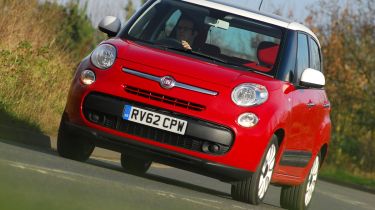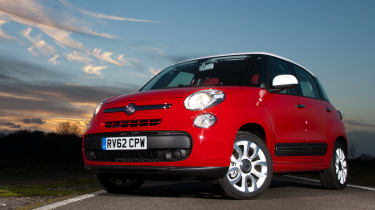Fiat 500L review - MPG, CO2 and Running Costs
The 500L should be pleasingly cheap to run, but rapid depreciation is the fly in the ointment

The Fiat 500L boasts a range of economical engines, the cleanest of which is the 1.3-litre Multijet diesel with the semi-automatic gearbox thanks to 70.6mpg and emissions of 105g/km of CO2. The regular 1.3-litre Multijet manages 67.3mpg with CO2 levels of 110g/km.
The 1.6-litre diesel is also pretty good, as it manages 62.8mpg, with CO2 emissions of 117g/km – and all the diesel variants are fitted with stop-start technology as standard.
Of the two petrol engines available, the 0.9-litre TwinAir is the better bet with an economy of 58.9mpg, plus 112g/km of CO2 – the figures are boosted because it’s the only petrol variant equipped with Fiat’s start-stop tech. The 118bhp 1.4-litre petrol unit is predictably the least efficient unit in the range, thanks to CO2 levels of 159g/km and 40.9mpg, while the 94bhp version of the same engine returns 45.6mpg and 145g/km.
To further increase fuel economy, Fiat has fitted the 500L with an 'ECO' button which lowers torque and strangles the throttle response. All 500L models fall within a sensible insurance group but servicing and some expensive options make the Fiat look a little pricey compared to some of its rivals.
The Trekking costs about £700 more to buy than a 500L Lounge, but it does slot in to a lower insurance group because it comes with an auto-braking system as standard.
Insurance groups
There’s quite a broad spread of performance in the 500L range, and the insurance groups reflect that. The slowest 1.3-litre diesel falls into group 7, while the fastest 1.6-litre diesel is group 18.
Depreciation
The 500L is not as desirable as its supermini sister model on the second hand market, and values are not nearly as strong. While the regular 500 can retain more than 50 per cent of its purchase price over three years and 30,000 miles, the worst performing 500L (which is the TwinAir petrol) could be worth less than a third of what you paid. Diesel versions should perform a little better.








